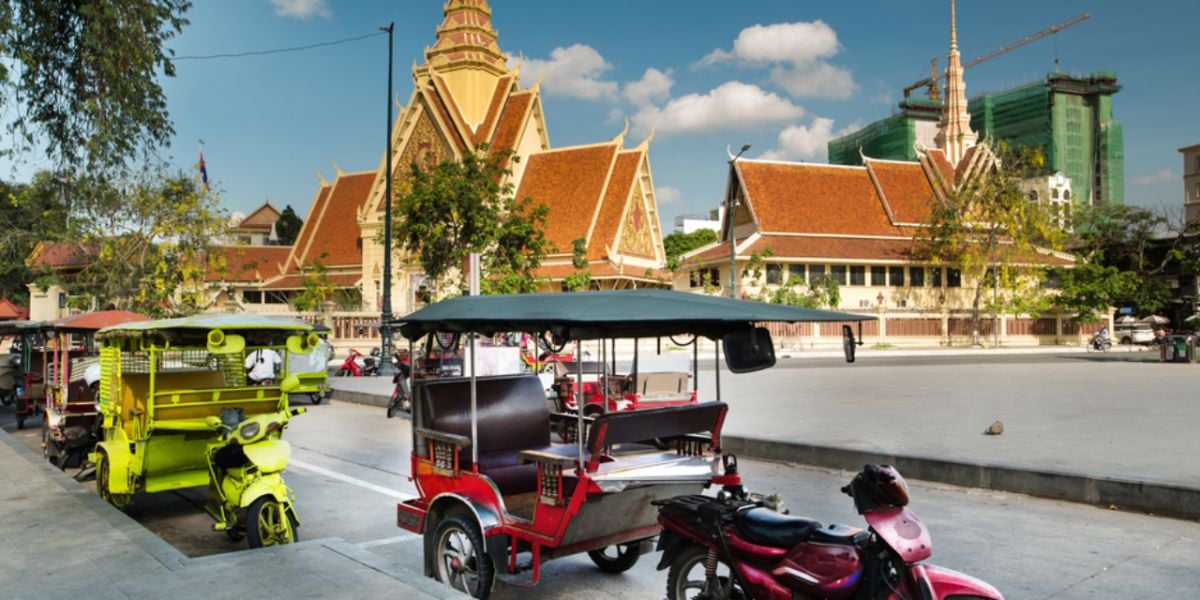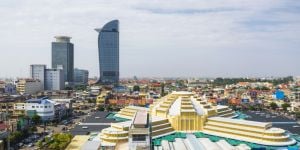
Phnom Penh is not an easy city to get around. It is a hectic city that, at the best of times, somehow works. This chaos is part of the charm of living there but does not make it easy to get around. At peak times, traffic is at a standstill, and the city floods heavily during the rainy season, making some roads impassable. Despite these downfalls, there are ways to get around the capital city.
Immediately upon arrival in the city limits, you will be thrown into the chaos of Phnom Penh. The roads swell with motorcycles, tuk-tuks, street food vendors, and just about anything else you can imagine. Without prior knowledge, it can be intimidating even to cross the street. While everything can seem a bit overwhelming, it's not as scary to get around as you might think.
Tuk-tuk in Phnom Penh
By far, the best way to get around Phnom Penh is by tuk-tuk. There are thousands of tuk-tuks patrolling the street at all hours of the day, making this a very convenient option. Prices are also very reasonable, with most rides in the city costing under 10,000 Riel ($2.50) the only issue is that they have to be bartered for.
Cambodia is a country built on bartering, whether it's for clothes or tuk-tuks. It is important to barter for your tuk-tuk rides. Even though you are arguing over pennies sometimes, if you don't barter, locals begin to think it's okay to overcharge expats for everything. Your best bet is to go for half of what they tell you. You can also use Grab to see what the price will be on that. With some luck and prior knowledge, you can get a price that is lower than the one listed by Grab. Even if your ride is a short distance and isn't worth more than 4,000 Riel ($1), never go below that price. A local may be able to get a ride for 3,000 Riel, but you most likely won't.
Never try to get a tuk-tuk from a tourist spot. They will always overcharge you. Try to walk a bit out of the centre and find one. If possible, flag one down who is driving instead of one parked on the side of the road. They are more likely to give you a fair price.
If you want to save the hassle of bartering, you can use one of the two ridesharing apps in the country- Grab or Passapp. Grab tends to be more reliable in Phnom Penh, but isn't available in other small cities in Cambodia. With Passapp, they charge by meter, and you have to make sure they are going the right way. Even if they make a mistake, you will end up paying for it. So in Phnom Penh, bartering and Grab are the best ways to hail a tuk-tuk.
Cars and motorbikes in Phnom Penh
You can also use your own mode of transportation. Motorcycles are much cheaper than cars, but both are readily available. You need an International license to drive in the country and to be prepared to be pulled over quite a few times. There is a lot of corruption, and police often try to pull you over then ask for a bribe.
While Phnom Penh is definitely not pedestrian-friendly, you can still make your way around on foot. Just be prepared to weave your way through lots of traffic. Most sidewalk space is reserved for parking, so you will likely be walking in the street. Remember to look both ways, as drivers often drive on the wrong side of the street.
Public transportation in Phnom Penh
Public transit exists in the city, but it is newly introduced and doesn't take you everywhere you need to go. It's also much slower than other modes of transport. It is; however, the cheapest way to get around the city. There are eight routes. You can purchase a ticket for 1,500 Riel ($0.40) which allows you to ride as far as you need on that route. The buses are airconditioned and much more comfortable than a tuk-tuk. Route 3 runs through most of the city and ends up at the airport, making it by far the best way to go to the airport.
We do our best to provide accurate and up to date information. However, if you have noticed any inaccuracies in this article, please let us know in the comments section below.









